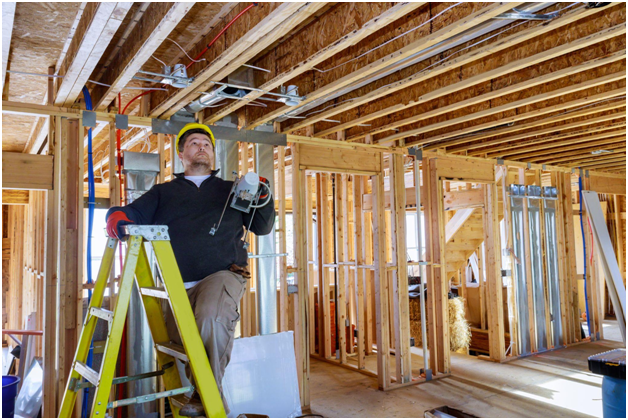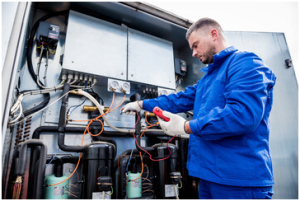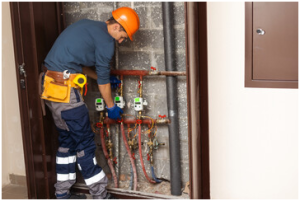
Electrical technology and HVAC are two distinct yet interrelated disciplines that are crucial in the construction and operation of modern buildings.
An associate degree in HVAC is accompanied by extensive training in electrical technology. This dual-purpose educational program prepares students for careers as both HVAC and Electrical technicians. Graduates may pursue careers in either or both jobs and find that many opportunities are currently available.
A career in electrical work cannot be downplayed because it forms the basis for HVAC work, new home and commercial construction, and many remodeling projects. Electrical technology enhances HVAC skills and makes the connection between theory and completed projects.
Electrical Technology Supports HVAC Work
 Electrical technology is a vital part of HVAC work including troubleshooting, repairing, installing, and removing equipment and systems. An entire HVAC system runs on electricity, and technicians must know how 120 and 220-volt electricity power systems.
Electrical technology is a vital part of HVAC work including troubleshooting, repairing, installing, and removing equipment and systems. An entire HVAC system runs on electricity, and technicians must know how 120 and 220-volt electricity power systems.
- The furnace and air conditioner are wired into the circuit breaker box
- The thermostat must be wired into the system to set temperatures and functions
- Wiring connections must be made to meet electrical codes
- Any loose or incorrect connections must be diagnosed and corrected
- The system must match the electrical load for the house or building
HVAC technicians put their knowledge and skills into use by applying electrical safety, motor controls, basic and advanced programmable logic controllers (PLCS), various wiring methods, the National Electrical Code (NEC), and lighting connections. Technicians also learn to work with related components in HVAC systems including fan motors, compressors, gas valves, and solenoid valves in their college training.
Electrical Technology Training
Electrical technology is a component of HVAC training in any high school or technical college program. Students gain a broad overview of heating, cooling, ventilation, and refrigeration work for homes and businesses. They develop skills for working on specific equipment such as:
- Inspecting devices, equipment, and complete systems
- Troubleshooting issues and repairing them
- Fundamental electrical circuitry and electrical codes
- Heat transfer and refrigeration essentials
- Safe work practices and advising customers
- Regulations governing electrical equipment
Electrical training consists of lecturers, laboratory activities, field trips, and individual student monitoring. Students practice on actual field-grade equipment and systems for practical applications. They also learn how to use PC Office and networking applications in their projects as well as workplace communications.
| “An associate degree in HVAC is accompanied by extensive training in electrical technology. This dual-purpose educational program prepares students for careers as both HVAC and Electrical technicians.” |
Electric Technology And HVAC Jobs And Careers
The demand for electrical and HVAC technicians is currently high across the U.S. According to the U.S. Bureau of Labor Statistics (BLS), jobs for electricians are projected to grow 6% from 2022 to 2032. About 73,500 new openings are projected each year during this time. This is a faster growth rate than the average for all other occupations. The median 2022 pay was $60,240 per year.
The BLS projects jobs for HVAC technicians to also grow 6% between 2022 and 2032. About 37,700 job openings are projected each year during the same decade. The median income for 2022 was $51,390 or $24.71 per hour.
Income for electrical and HVAC technicians varies with the company and the worker’s experience and expertise. Jobs are available in residential, commercial, and industrial sectors for new construction, remodeling, and repair work.
Electrical Technology And HVAC Technology: Best Of Both Worlds
 HVAC graduates enjoy the best of both worlds of electrical and heating and cooling work opportunities. Each serves as a backup for the other when seeking jobs and careers. New technical college graduates may find that one of the two specialties needs more employees in their areas. This provides a higher chance of landing a job if you do not want to move.
HVAC graduates enjoy the best of both worlds of electrical and heating and cooling work opportunities. Each serves as a backup for the other when seeking jobs and careers. New technical college graduates may find that one of the two specialties needs more employees in their areas. This provides a higher chance of landing a job if you do not want to move.
HVAC as a dual-purpose career provides jobs as residential, commercial, industrial, auto, wind turbine, and maintenance electricians. The levels of expertise go from apprentice, journeyman, and finally master electrician. You will advance from one level to the next with a minimum number of years of experience, level of expertise, and certification.
A Great Place For Training
Preparing yourself with an associate degree in HVAC opens many doors for jobs and careers.
There is an old saying that tells us ‘there’s no place like home.” If you live in the Greater Baton Rouge area, ITI Technical College is a home-based school of excellence.
Earn an Associate of Occupational Studies (AOS) Degree in our Air Conditioning, Electrical, and Refrigeration Technology Program to prepare for an entry-level job. Our faculty and support staff are dedicated to your educational and training success. Visit our website today for more information about electrical technology and HVAC.
For more information about graduation rates, the median debt of students who completed the program, and other important information, please visit our website at: https://iticollege.edu/disclosures/




